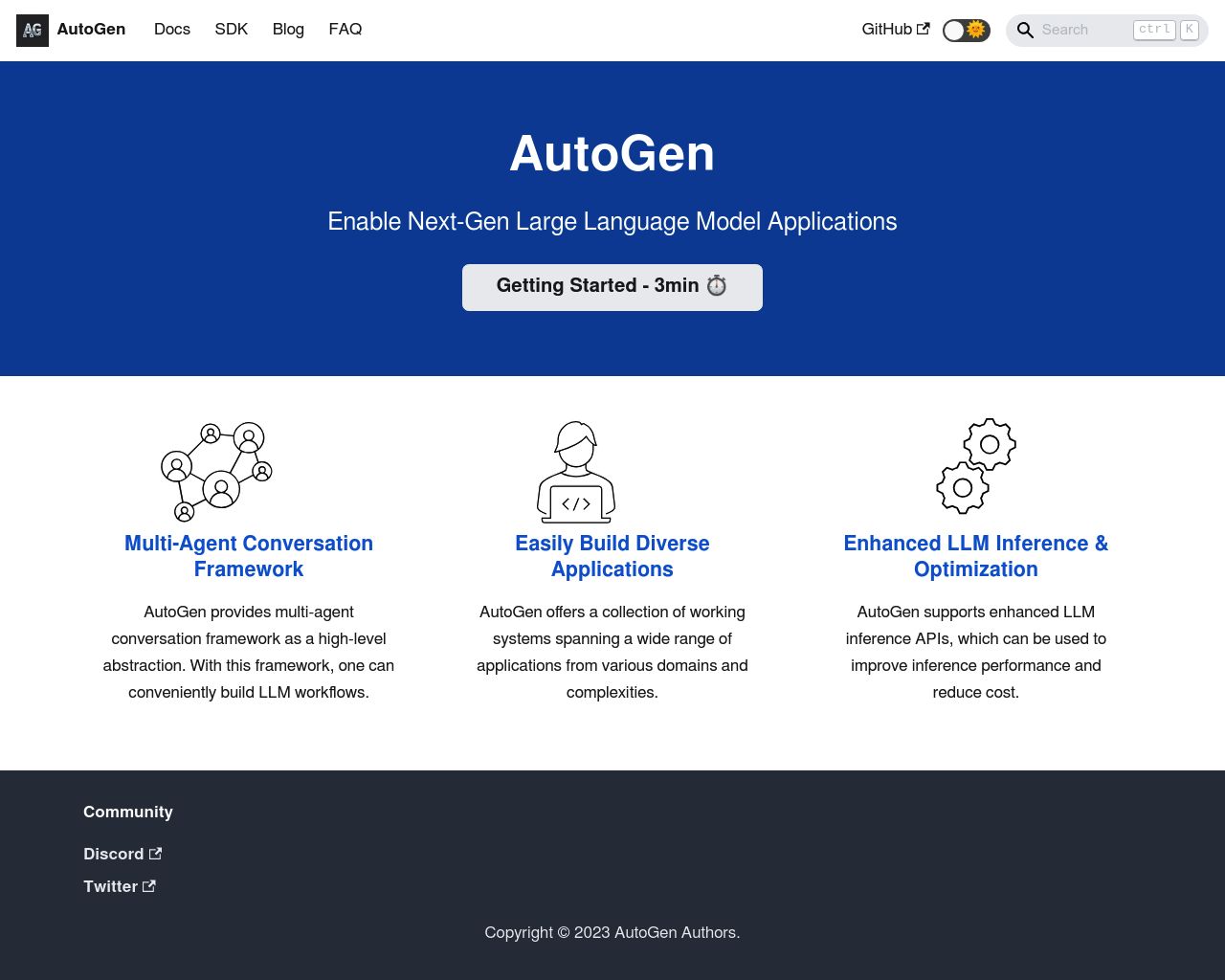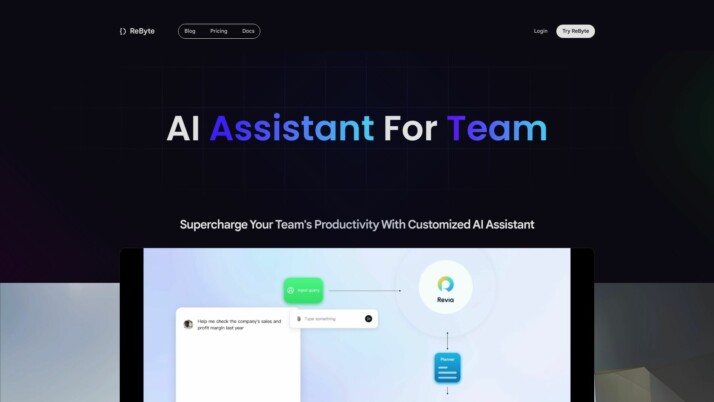AutoGen vs. Rebyte: Comparing AI Agent Development Platforms
AI agent development platforms AutoGen vs. Rebyte offer powerful capabilities for building sophisticated AI applications, yet each takes a distinct approach. AutoGen excels in multi-agent collaboration and provides developers with fine-grained control, while Rebyte emphasizes visual building and no-code options for broader accessibility. This comparison explores the strengths, limitations, and key differentiators of both platforms, diving into their core components, security features, and development philosophies.
We’ll also introduce SmythOS, a comprehensive solution that addresses gaps in both AutoGen and Rebyte, offering robust security, extensive integrations, and versatile deployment options. Whether you’re a seasoned developer or a business leader exploring AI automation, this analysis will help you navigate the landscape of AI agent builders and choose the platform that best suits your needs.
AutoGen Overview
AutoGen empowers developers to build sophisticated AI applications using multi-agent conversations. This open-source framework orchestrates customizable agents that interact with each other, Large Language Models (LLMs), tools, and humans to tackle complex tasks.


AutoGen’s core strength lies in its ability to facilitate autonomous multi-agent collaborations. These agents work together to solve problems, generate code, and handle intricate workflows with or without human input. The framework maximizes LLM performance through advanced inference techniques, including tuning, caching, and error handling.
AutoGen’s core strength lies in its ability to facilitate autonomous multi-agent collaborations… to solve problems, generate code, and handle intricate workflows with or without human input.
Developers can tailor agents to specific needs, integrating LLMs, human feedback, and various tools. This flexibility makes AutoGen adaptable for a wide range of applications, from automated task solving to complex problem-solving in group chats. The framework supports both fully autonomous operations and human-in-the-loop scenarios, catering to diverse use cases.
AutoGen provides robust debugging and logging tools, essential for optimizing LLM-based systems. It includes EcoOptiGen, a cost-effective technique for tuning large language models, demonstrating its focus on enhancing LLM efficiency. While AutoGen offers powerful capabilities for AI development, it requires coding knowledge, which may limit accessibility for non-technical users seeking no-code solutions.
The framework’s vision centers on maximizing LLM utility in multi-agent setups, promoting autonomous operations with optional human involvement. AutoGen’s versatility and focus on conversation-driven control make it a valuable tool for developers and researchers pushing the boundaries of conversational AI and LLM applications.
Rebyte Overview
Rebyte empowers users to create AI-powered applications without extensive coding skills. The platform’s visual agent builder allows rapid development of customizable AI agents with complex backend logic. Users can craft fully tailored user interfaces for these agents using a no-code approach.


Rebyte integrates seamlessly with private data sources, providing detailed observability into each step of an agent’s process. Its serverless runtime facilitates production deployment and scaling, democratizing AI application development for knowledge workers and teams.
Rebyte empowers users to create AI-powered applications without extensive coding skills. The platform’s visual agent builder allows rapid development of customizable AI agents with complex backend logic.
The platform manages the entire lifecycle of AI applications, from ideation to deployment, with minimal manual coding required. Rebyte’s key differentiators include its visual builder, integrated runtime, and focus on end-user programming through AI. This approach aligns with their vision of ushering in an era where anyone can transform ideas into deployed applications simply by describing their goals.
Rebyte’s capabilities extend to creating multi-step AI agents using large language models, enabling the construction of sophisticated workflows. The platform’s emphasis on customization and integration positions it as a versatile tool for businesses seeking to leverage AI for productivity gains and workflow automation.
While Rebyte offers powerful features for AI application development, it may have limitations in areas such as advanced debugging tools or specialized deployment options. Users should consider their specific needs and technical expertise when evaluating Rebyte against other AI agent builders in the market.
Feature Comparison
AutoGen and Rebyte offer distinct approaches to AI agent development, with notable feature gaps in core components and security. AutoGen excels in multi-agent collaboration and custom agent development, providing robust debugging tools and support for autonomous operations. Its code-based configuration allows for fine-grained control but may limit accessibility for non-technical users. Rebyte, conversely, emphasizes visual building and no-code options, making AI application development more accessible to a broader audience. However, it lacks some of AutoGen’s advanced debugging capabilities and specialized deployment options.
In terms of core components, AutoGen provides stronger support for persistent memory and context management, crucial for complex, long-running tasks. It also offers more extensive options for human-AI interaction and audit logging. Rebyte’s strength lies in its visual interface and customizable UIs, which AutoGen does not offer. This gap highlights Rebyte’s focus on rapid development and deployment for non-technical users.
Security features reveal another significant gap. While AutoGen supports OAuth and API key authentication, it lacks explicit features for data encryption and IP control. Rebyte’s documentation doesn’t provide clear information on its security measures, indicating a potential area of concern for both platforms. Neither explicitly mentions constrained alignment features, crucial for ensuring AI behavior aligns with organizational goals and ethical guidelines. SmythOS addresses these gaps by offering robust security features including data encryption, OAuth, and IP control, alongside its visual builder and no-code options, providing a more comprehensive solution for secure and accessible AI agent development.
Feature Comparison Table
| AutoGen | Rebyte | SmythOS | |
|---|---|---|---|
| CORE FEATURES | |||
| Visual Builder | ❌ | ✅ | ✅ |
| No-Code Options | ❌ | ✅ | ✅ |
| Autonomous Agents | ✅ | ❌ | ✅ |
| Multimodal | ✅ | ❌ | ✅ |
| Multi-Agent Collaboration | ✅ | ❌ | ✅ |
| Agent Work Scheduler | ❌ | ✅ | ✅ |
| SECURITY | |||
| Constrained Alignment | ❌ | ❌ | ✅ |
| Data Encryption | ✅ | ❌ | ✅ |
| OAuth | ✅ | ❌ | ✅ |
| IP Control | ❌ | ❌ | ✅ |
| COMPONENTS | |||
| Huggingface AIs | ✅ | ❌ | ✅ |
| Classifiers | ✅ | ❌ | ✅ |
| Logic | ✅ | ❌ | ✅ |
| Data Lakes | ❌ | ❌ | ✅ |
| DEPLOYMENT OPTIONS (EMBODIMENTS) | |||
| Deploy as Webhook | ✅ | ❌ | ✅ |
| Staging Domains | ❌ | ❌ | ✅ |
| Production Domains | ❌ | ❌ | ✅ |
| API Authentication (OAuth + Key) | ✅ | ❌ | ✅ |
| Deploy as Scheduled Agent | ❌ | ❌ | ✅ |
| DATA LAKE SUPPORT | |||
| Hosted Vector Database | ❌ | ✅ | ✅ |
| Sitemap Crawler | ❌ | ❌ | ✅ |
| YouTube Transcript Crawler | ❌ | ❌ | ✅ |
| URL Crawler | ✅ | ❌ | ✅ |
Best Alternative to AutoGen and Rebyte
SmythOS stands out as the superior alternative to AutoGen and Rebyte, offering a comprehensive AI agent development platform that addresses the limitations of both competitors. We combine the best of both worlds: the powerful multi-agent capabilities of AutoGen and the user-friendly visual building approach of Rebyte, while adding unique features that set us apart.
Our drag-and-drop interface makes AI agent creation accessible to users of all skill levels, eliminating the need for extensive coding knowledge. This visual approach, coupled with our extensive library of pre-built components and templates, allows for rapid development and deployment of AI solutions. Unlike AutoGen’s code-heavy approach or Rebyte’s limited customization options, SmythOS offers both ease of use and deep customization capabilities.
SmythOS stands out as the superior alternative to AutoGen and Rebyte, offering a comprehensive AI agent development platform that addresses the limitations of both competitors.
SmythOS excels in multi-agent collaboration, a feature where AutoGen shines but Rebyte falls short. Our platform supports complex, autonomous agent interactions, enabling teams of AI agents to work together on sophisticated tasks. This capability, combined with our robust memory and context management, allows for the creation of AI systems that can handle long-running, intricate processes with ease.
Security is a critical concern in AI development, and SmythOS addresses this head-on. We offer advanced security features including data encryption, OAuth integration, and IP control — areas where both AutoGen and Rebyte have significant gaps. Our constrained alignment capabilities ensure that AI agents behave in accordance with organizational goals and ethical guidelines, a crucial feature for businesses deploying AI at scale.
SmythOS also stands out in its deployment flexibility. We support a wide range of deployment options, including APIs, webhooks, scheduled agents, and integration with popular platforms like ChatGPT. This versatility, coupled with our scalable infrastructure, ensures that AI solutions built with SmythOS can adapt to growing business needs and integrate seamlessly with existing systems. Whether you’re a small startup or a large enterprise, our platform provides the tools and capabilities to bring your AI vision to life, faster and more efficiently than ever before.
Conclusion
AutoGen, Rebyte, and SmythOS each offer unique approaches to AI agent development, catering to different user needs and technical expertise levels. AutoGen excels in multi-agent collaboration and provides robust debugging tools, making it ideal for developers seeking fine-grained control. Rebyte emphasizes visual building and no-code options, democratizing AI application development for a broader audience.
While both platforms have their strengths, SmythOS emerges as the superior choice, addressing the limitations of AutoGen and Rebyte while offering a comprehensive suite of features. SmythOS combines the best of both worlds – a user-friendly visual builder for rapid development and the flexibility to handle complex, code-based configurations when needed. Its extensive integration ecosystem, with over 300,000 pre-built connections, surpasses the capabilities of both AutoGen and Rebyte, allowing for seamless incorporation into existing workflows.
SmythOS stands out with its robust security features, including data encryption, OAuth support, and IP control – areas where AutoGen and Rebyte fall short. The platform’s ’Create Once, Deploy Anywhere’ philosophy, coupled with its support for multiple AI models and deployment options, offers unparalleled versatility. From chatbots to APIs, SmythOS enables businesses to leverage AI across various channels effortlessly.
For those ready to experience the future of AI agent development, we invite you to create a free SmythOS account. With our risk-free trial offering unlimited agents and a 30-day money-back guarantee, you can explore the full potential of AI automation without commitment. Discover how SmythOS can revolutionize your workflow and unlock new levels of productivity by exploring our diverse range of AI-powered agent templates. Take the first step towards transforming your business with intelligent, customizable AI solutions today.
Last updated:
Disclaimer: The information presented in this article is for general informational purposes only and is provided as is. While we strive to keep the content up-to-date and accurate, we make no representations or warranties of any kind, express or implied, about the completeness, accuracy, reliability, suitability, or availability of the information contained in this article.
Any reliance you place on such information is strictly at your own risk. We reserve the right to make additions, deletions, or modifications to the contents of this article at any time without prior notice.
In no event will we be liable for any loss or damage including without limitation, indirect or consequential loss or damage, or any loss or damage whatsoever arising from loss of data, profits, or any other loss not specified herein arising out of, or in connection with, the use of this article.
Despite our best efforts, this article may contain oversights, errors, or omissions. If you notice any inaccuracies or have concerns about the content, please report them through our content feedback form. Your input helps us maintain the quality and reliability of our information.
